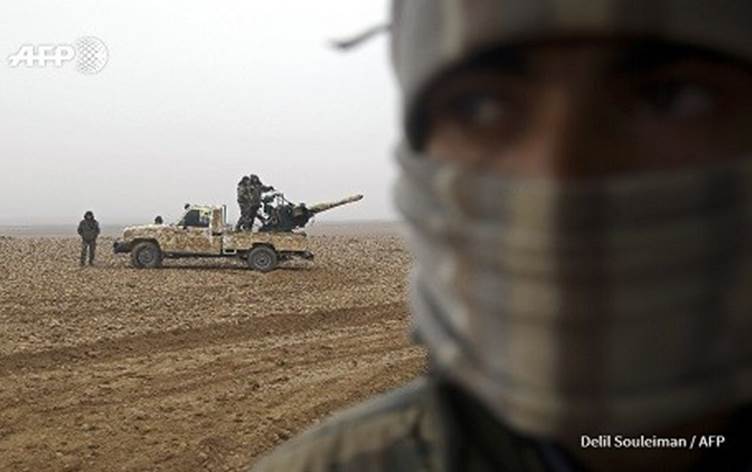ERBIL, Kurdistan Region – A coalition airstrike near Raqqa this week killed a senior ISIS military leader, the coalition confirmed in a statement published Thursday.
Abu Jandal al-Kuwaiti, “was a previous member of the ISIL's War Committee and was involved in their retaking of Palmyra, Syria, before being reassigned to Tabqa to try to improve ISIL's defenses against the Syrian Democratic Forces,” reads a statement from the Combined Joint Task Force of the US-led global coalition fighting ISIS in Iraq and Syria.
Al-Kuwaiti was killed on Monday in an airstrike near Tabqa Dam, west of Raqqa where the Syrian Democratic Forces (SDF) are fighting the extremists.
The statement added that al-Kuwaiti “was involved in the use of suicide vehicles, IEDs and chemical weapons against the SDF.”
Tabqa city, 40 kilometres west of Raqqa, is of strategic importance – it is home to both a major dam and a former airbase.
The conflict monitor Syrian Observatory for Human Rights stated that “leading figures” of ISIS live in the city, which also houses the militant group’s largest prison where key prisoners are being held.
As of the early this week, the SDF are within five kilometres from Tabqa Dam.
The global coalition has been supporting the SDF in their offensive, including providing heavy air support. The US has carried out more than 100 airstrikes near Tabqa Dam since December 9, US Special Presidential Envoy to the coalition Brett McGurk tweeted on Thursday.
The SDF launched the second phase of their Wrath of Euphrates campaign to liberate Raqqa city from ISIS on December 10. The goal of this phase of the military offensive is to “fully liberate the western countryside of Raqqa as well as isolating the city,” the SDF stated.
McGurk tweeted on Thursday that the SDF have so far cleared 1,900 square kilometres in their campaign to isolate Raqqa.
Abu Jandal al-Kuwaiti, “was a previous member of the ISIL's War Committee and was involved in their retaking of Palmyra, Syria, before being reassigned to Tabqa to try to improve ISIL's defenses against the Syrian Democratic Forces,” reads a statement from the Combined Joint Task Force of the US-led global coalition fighting ISIS in Iraq and Syria.
Al-Kuwaiti was killed on Monday in an airstrike near Tabqa Dam, west of Raqqa where the Syrian Democratic Forces (SDF) are fighting the extremists.
The statement added that al-Kuwaiti “was involved in the use of suicide vehicles, IEDs and chemical weapons against the SDF.”
Tabqa city, 40 kilometres west of Raqqa, is of strategic importance – it is home to both a major dam and a former airbase.
The conflict monitor Syrian Observatory for Human Rights stated that “leading figures” of ISIS live in the city, which also houses the militant group’s largest prison where key prisoners are being held.
As of the early this week, the SDF are within five kilometres from Tabqa Dam.
The global coalition has been supporting the SDF in their offensive, including providing heavy air support. The US has carried out more than 100 airstrikes near Tabqa Dam since December 9, US Special Presidential Envoy to the coalition Brett McGurk tweeted on Thursday.
Kuwaiti was killed near Tabqa Dam after leading ISIL's recent operations in Palmyra. US has conducted 100+ strikes near Tabqa Dam since 12/9
— Brett McGurk (@brett_mcgurk) December 29, 2016
The day that al-Kuwaiti was killed, the coalition carried out nine airstrikes near Raqqa, according to the coalition’s daily press release on airstrikes.
The SDF launched the second phase of their Wrath of Euphrates campaign to liberate Raqqa city from ISIS on December 10. The goal of this phase of the military offensive is to “fully liberate the western countryside of Raqqa as well as isolating the city,” the SDF stated.
McGurk tweeted on Thursday that the SDF have so far cleared 1,900 square kilometres in their campaign to isolate Raqqa.




Comments
Rudaw moderates all comments submitted on our website. We welcome comments which are relevant to the article and encourage further discussion about the issues that matter to you. We also welcome constructive criticism about Rudaw.
To be approved for publication, however, your comments must meet our community guidelines.
We will not tolerate the following: profanity, threats, personal attacks, vulgarity, abuse (such as sexism, racism, homophobia or xenophobia), or commercial or personal promotion.
Comments that do not meet our guidelines will be rejected. Comments are not edited – they are either approved or rejected.
Post a comment